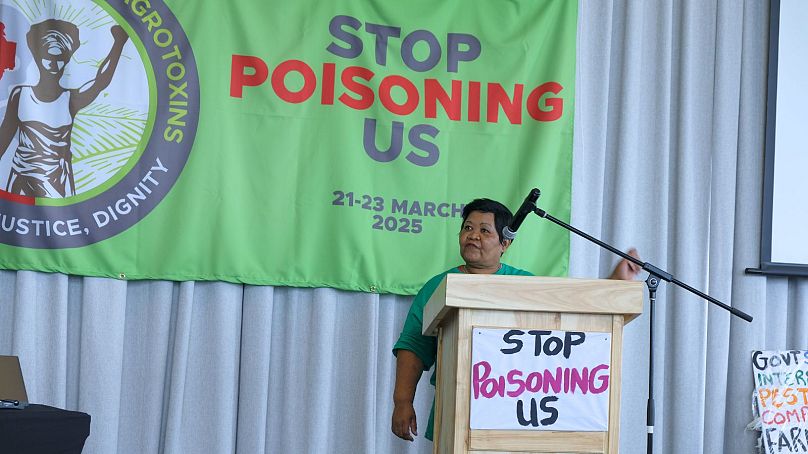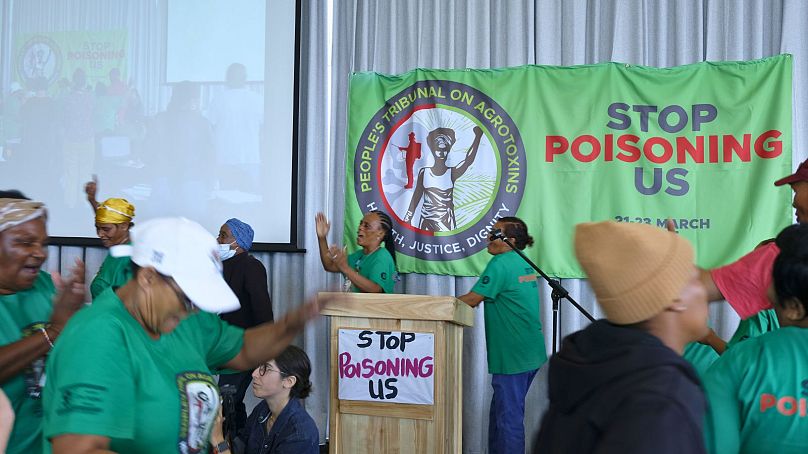When Dina Ndelini, who had spent over four decades laboring in the vineyards near Cape Town, unexpectedly found herself struggling to breathe, a visit to the medical facility rapidly led to a cascade of misfortunes. She not only lost her well-being but also her employment and consequently, her residence.
Based on what her physician said, the primary suspect seemed to be exposure to a chemical mixture called Dormex. This substance is frequently employed as a plant growth regulator in South Africa; however, its main component, cyanamide, has been characterized as extremely hazardous by experts. EU Chemicals Agency (ECHA) and prohibited in the European Union since 2009.
Nevertheless, Dormex is merely one of many. long list Of highly dangerous chemicals that continue to be manufactured within European territories and exported to other nations. Subsequently, food products created overseas using these chemicals are imported and placed on the shelves of supermarkets across Europe.
Dina’s story was among numerous accounts recounted by agricultural laborers along with both legal and healthcare experts at a recent event. People’s Tribunal on Agrotoxins , which occurred from 21-23 March in the midst of the renowned Stellenbosch wine district.
Although not an official courtroom setting, these community-organized tribunals offer a platform where individuals affected can present their accounts before distinguished jurists who evaluate claims related to breaches of international laws, encompassing areas such as environmental protection and human rights.
South African agricultural laborers call on Europe to halt the shipment of 'toxins.'
When asked for her message to Europe, Dina was straightforward. "As agricultural laborers, we've had enough—we do not want more of these pesticides coming from Europe," she states, encouraging the European Union to "cease sending us its harmful substances."
Throughout the two-day tribunal, this sentiment was repeated frequently as agricultural workers testified about how pesticide exposure had affected their health, ranging from lung damage to ovarian cancer and visual impairment.
If it doesn’t meet the standards of Europeans, then why would they think it’s acceptable for us?" asks another farmworker, requesting anonymity, noting further that European consumers ought to be aware of "the actual human conditions behind the production. wine they are drinking”.
As per the African Centre for Biodiversity, 192 highly hazardous pesticides are still officially used in South Africa , with 57 being prohibited for use within the European Union. Several of these are known to be neurotoxic or carcinogenic, whereas others are classified as highly dangerous to the ecosystem.
The individuals most exposed are the farm workers and their nearby communities, who find themselves at the bottom of the nation’s intricate social hierarchy due to historical economic disparities stemming from the apartheid era.
Often exploited due to their heavy workload, insufficient pay, and inadequate protection under uncertain employment terms, farm laborers have minimal influence over the management of these estates, which are typically overseen by affluent landowners referred to as boers ('farmers').
Women are among those most at risk, as they are both more biologically prone to pesticide exposure and more vulnerable In South African communities, as stated by South Africa’s Women on Farms project (WFP), a non-governmental organization aiming to safeguard female agricultural workers in the Western and Northern Cape.
During the hearing, workers consistently stated that they were not supplied with personal protective gear. Many testified that female employees often use scarves to shield their faces while working. Other laborers recounted lacking access to running water or restrooms within the vineyard premises.
Prohibited pesticide exports labeled as 'a clear case of double standards'
Efforts to harmonize trading practices are under scrutiny in Brussels, following the release of a fresh EU agricultural policy framework that outlines strategies to limit food imports from non-EU nations containing pesticide residues prohibited within European borders.
It isn’t the first instance where the EU has contemplated taking this action, as discussions about potential restrictions on exporting prohibited pesticides have been ongoing for several years.
However, the proposals encounter strong resistance from agricultural industry organizations, such as the pesticide lobbying group CropLife, which has consistently maintained that these measures pesticides become essential under specific conditions.
The operational aspects of South African farming significantly vary, making comparisons with other nations and areas challenging," statedCropLife South Africa after the tribunal. The organization asserts that varying crops, pests, and weather patterns necessitate "distinct approaches and pesticides at various points in time.
This point doesn’t carry much weight for UN Special Rapporteur on toxics and human rights, Dr Marcos Orellana. He states, "The human body is identical across all regions; however, the disparity lies in the inadequate capability of governmental organizations to manage the dangers faced by individuals in precarious conditions." He refers to this as an outright 'double standard'.
Global safeguards reduced to a 'checklist' routine
South Africa Does have legal frameworks regulating the use of these chemicals and plans to gradually eliminate highly dangerous pesticides in the coming years; however, tribunal participants contended that enforcement is frequently inadequate. Additionally, farmworkers are often uninformed about or hesitant to assert their rights.
According to the UN’s Orellana, the assertion that governments have sovereignty over making their own choices highlights "the insufficient capabilities in numerous, if not all, developing nations engaged in the global pesticide trade." This perspective also sidesteps problems such as corruption and the undue influence exerted by corporations on governmental bodies responsible for these decisions.
More broadly, an internationally recognized agreement known as the Rotterdam Convention is aimed at promoting well-informed decision-making among nations involved in trading hazardous chemicals.
However, according to Dr. Andrea Rother, who leads the environmental health department at the University of Cape Town, the convention is overly complex and ineffective. She explains that "by the time a pesticide makes it onto the list, these chemicals are usually outdated." Furthermore, she suggests that this agreement functions more like a mere formality—a simple 'check-the-box' procedure—rather than serving as an authentic protective measure.
Rother notes that since no African nation produces its own pesticide components, a prohibition on the European Union’s end would greatly assist South Africa.
"She suggests that there are alternative options to these pesticides," asserting that an export ban could serve as a "trigger" for promoting greater adoption of them. sustainable agricultural systems .
According to Kara MacKay, who holds the position of campaigns coordinator at WFP, every additional day that the EU persists in producing and exporting these banned pesticides to South Africa makes them "accomplices in the ongoing pesticide poisoning of agricultural workers and residents."
"We need to put an end to this harmful trade—suggesting otherwise exposes a racially biased and colonial mindset that lacks justification," she states.
Meanwhile, the expert judges presiding over the People’s Tribunal will assess the evidence submitted by Dina and the other farmworkers, subsequently providing their judgment along with legal recommendations several months from now.
.png)

